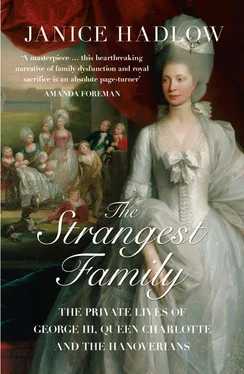George and Caroline’s had been an unconventional kind of marriage; but George could say, with some justification, that it had delivered for him an experience of happiness that had been so conspicuously denied to his mother and father. Even at their worst times, he and Caroline had never been less than a partnership, one which, for all the turbulence within it, was held together by the powerful dynamic of their mutual attraction. But they had extended none of that sense of inclusiveness to their son, and as George sat grieving for his wife, he might have reflected that he found himself in much the same position as his father had been before him: a man alone, alienated from a son he distrusted and despised. It would now be left to the generation that came after them to try to repair what George and Caroline had left undone. Frederick’s wife Augusta was pregnant again by the time the queen died. Caroline did not live to see the birth of her first grandson in June 1738. Frederick named the baby George, after his grandfather. It remained to be seen whether he had learnt more from the treatment he had received at the hands of his parents than George and Caroline had done; and whether he could prevent the legacy of bitterness that had so darkened his own life from surfacing to cast a similar shadow over that of his son.
FREDERICK AND AUGUSTA’S FIRST SON, George, was born on 24 May 1738 at Norfolk House in St James’s Square. He was a seven months’ child, and ‘so weakly at the time of his birth, that serious apprehensions were entertained that it would be impossible to rear him’. 1He was baptised that night, noted the diarist Lord Egmont, ‘there being a doubt that he could live’, but like his sister before him, the baby George clung tenaciously to life. 2In later years, he had no doubt whom he had to thank for his survival: Mary Smith, his wet nurse, ‘the fine, healthy, fresh-coloured wife of a gardener’. When she died in 1773, George was still conscious of the debt of gratitude he bore her. ‘She suckled me,’ he recalled, ‘and to her great attention my having been reared is greatly owing.’ 3When told that etiquette made it impossible for the infant George to sleep with her, she had ‘instantly revolted, and in terms both warm and blunt, she thus expressed herself: “Not sleep with me! Then you may nurse the boy yourselves!”’ 4The forthright Mary Smith won the battle, and with it the unwavering affection of the prince.
In 1743, Frederick moved his growing family – another son Edward had been born in 1739, and six other children were to follow, in almost annual succession over the next decade – to a bigger establishment. Leicester House, a large but ugly building, stood on the north side of what is now Leicester Square. It was not the most fashionable of neighbourhoods, being rather too near louche Soho for the politest society, and Frederick was by far its grandest inhabitant. His neighbours were businessmen, musicians and artists, most notably William Hogarth who had his studios across the square at number 32. Frederick was not short of places to live – he spent a great deal of money on nearby Carlton House, and rented properties for the summer on the Thames at Kew and at Cliveden – but it was Leicester House that became his principal residence. It was where he held informal court, assembling around him a group of ambitious young men who were as impatient as he was with his father’s government. With their support, Leicester House became the basis for Frederick’s political operations, the campaign headquarters from which he directed his attacks on the king’s ministers with such sustained effort that the term ‘Leicester House’ soon became synonymous with the very idea of princely political opposition. But the Soho property was also a family home; all Frederick and Augusta’s children grew up there, and their eldest son George seems to have retained an affection for it; he used it as his London house until very shortly before he became king.
George II never visited. He remained estranged from his son, although with the death of Queen Caroline some of the furious antipathy that had characterised their relationship ebbed away. The king occupied himself with his cards, his mistress and his military campaigns. His only engagement with Frederick was through the distancing formalities of party politics, where the two fought out their differences by ministerial and opposition proxies. They took care never to meet. Horace Walpole was once at a fashionable party where the usual precautions had somehow failed, and Frederick and his father were both embarrassingly present (‘There was so little company that I was afraid they would be forced to walk about together’), but this was a rare occurrence. 5Beyond the public stage of politics, the prince and the king lived carefully segregated existences.
Although he was now both paterfamilias and politician, Frederick continued to conduct his life with the same breezy goodwill and indifference to criticism that had so infuriated his parents when he was younger. If his ability to tell people what they wanted to hear coined him a reputation for duplicity, and his relaxed attitude to matters of political principle led to accusations of inconstancy, he was also singularly lacking in the anger and suppressed rage that had characterised so much of his parents’ lives. If he was resentful at their treatment of him, he concealed it very well; in public he appeared to be entirely unmarked by their baroque hostility. He was the least bitter of the early Hanoverians and, as such, seemed to have the best opportunity to the break the inheritance of dynastic unhappiness which his parents had passed on to him with such relish. In many ways, and with profound consequences for the development of his eldest son’s character, Frederick rose to the challenge. In his attitude to his wife and family, he represents a crucial and often underestimated bridge between the very different worlds of George II and George III.
Frederick’s conception of family life did not, however, extend to the practice of conjugal fidelity. He was his father’s son in that, at least. One of his favourites was Grace, Lady Middlesex, whom Horace Walpole described as ‘very short, very plain, and very yellow’. But, as Walpole saw, none of these affairs really mattered; they certainly did not disrupt the settled ecology of Frederick’s marriage, as those of his father had done: ‘Though these mistresses were pretty much declared, he was a good husband.’ Augusta, sensibly in Walpole’s opinion, ignored the transient lovers and reaped the benefits as a result. ‘The quiet inoffensive good sense of the princess (who had never said a foolish thing, nor done a disobliging one since the day of her arrival) … was always likely to have preserved her ascendancy over him.’ 6Frederick’s relationship with his wife had none of the obsessive, jealous intensity that marked his father’s feelings for his mother; nor did it have about it the toxic undercurrents that damaged so many of those who came into too close contact with his parents’ passion.
His marriage was entirely lacking in the drama that characterised George and Caroline’s union, yet there is little doubt that Frederick loved and desired his wife. The prince, who was proud of his literary talents, wrote a series of verses to Augusta celebrating her physical charms, including ‘those breasts that swell to meet my love,/That easy sloping waist, that form divine’. But as the poem made clear, it was not her body for which her husband most admired her: ‘No – ’tis the gentleness of mind, that love,/so kindly answering my desire/ … That thus has set my soul on fire.’ 7It was Augusta’s mild, unchallenging personality that Frederick found particularly appealing. From the earliest days of their marriage he had been delighted to discover that his wife was everything his mother was not: calm and pliable, with no discernible tastes or ambitions other than those her husband encouraged her to share. Her docility was one of her chief attractions, as Augusta herself seems clearly to have understood. Throughout their marriage, she never did or said anything to discommode or contradict him. One of the prince’s friends, in a parody of Frederick’s uxorious verses, added to the list of Augusta’s virtues ‘that all-consenting tongue,/that never puts me in the wrong’. 8
Читать дальше












